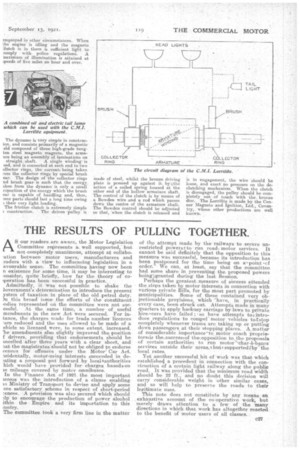THE RESULTS OF PULLING TOGETHER.
Page 23

If you've noticed an error in this article please click here to report it so we can fix it.
AS our readers are aware, the. Motor Legislation Committee refiresents a, well supported,' but -not ,completely.unanimous, attempt at collabo:ation between motor users, manufacturers and radars with a view to influencing legislation in a avourable -sense. The committee having now been n existence for some time, it may he interesting to :onsider, quite briefly, how far the theory of co;peratien has been succesdul in practice. Admittedly, it was not possible to shake the 3-overnment's determination to introduce the present yste.m of taxation in place of the old petrol duty. )n this broad issue the efforts of the constituent . *dies represented on the committee were not sueessful. At the Same time, a number of useful mendments in the new Act were secured. For intanee, the charges made for trade number licences :ere reduced and the uses allowed to be made of a ehiele so licensed were, to some extent, increased. 'he amendments also slightly improved the position f drivers, providing that endorsements should be mcelled after three years with a. clear sheet, and: iat the magistrates shouldnot be obliged to endorse eences for offences under the Motor' Car Act, Acidentally, motor-using interests succeeded in demting a proposal put forward by localltautherities hich would have provided for charges based*on se mileage, covered by motor omnibuses. In the Finance Act of 1921 the most important tecess was the introduction of a, clause enabling, le, Ministry of Transport to devise and apply some ore satisfactory scheme in respect of short-period enetes. A provision was also secured which should .11ii.to encourage the production of power alcohol ithin the Empire and its importation to this iuntry.
The committee took a very firm line in the matter
of the attempt made by the railways to secure unrestricted powers.: to run road, motor services. It cannot be said definitely that the opposition to this measure was successful, because its introduction has been postponed for the time being on aepoint -of order. We can, at least, say that the committee had some share in preventing the. proposed powers being'a-ranted during the last Session.
Perhaps the greatest measure of success attended the steps taken by motor interests in connection with various private Bills, for the most part. promoted by municipalities. Some of these contained very objectionable proyisions. which 'have, in practically every case, been struck out. Attempts made in many quarters to apply hackney carriage by-laws to private hire'-'ears have failed ; so have attempts to introduce regulations to compel' motor vehicles totstop completely whenever trams are taking up or putting down passengers at their stopping places. A.matter of considerable importance-to motor coach propries torstie the,successt of the:opposition to. the proposals of certain authorities to run motoe•char-a-bancs services outside their areas,N but k supported dby the local rates.
Yet another successful bit of work was that which established a precedent in connection with the construction of a certain light railway along the public road. It was provided that the minimum road width should be 22 ft., and no doubt this decision will carry considerable weight in other similar cases, and so will help to preserve the roads to their legitimate uses.
This note does not constitute by any means an exhaustive account of the eceoperative work, but merely • draws attention to a few of the Many directions in which that work has altogether reacted to the benefit of motor users Of all classes.
































